Social Responsibilities of Business and Business Ethics Chapter Notes | Business Studies (BST) Class 11 - Commerce PDF Download
Social responsibility means a business's duty to contribute positively to society while earning profits. It involves going beyond legal requirements to act ethically, protect the environment, and consider the interests of all stakeholders—customers, employees, government, and the community. Let us learn more.
What is Social Responsibility?
The social responsibility of business involves its duty to make decisions and take actions that are beneficial according to the goals and values of society.

Need for Social Responsibility
Should a business focus only on profit for its owners, or also consider the interests of customers, employees, suppliers, government, and the community?
- Social responsibility is about doing what is ethically right, beyond just legal duties.
- It involves voluntary actions by businesses to benefit society.
- While businesses exist to meet human needs, not all leaders agree on their broader role—some prioritise only owners, while others believe businesses should also serve society.
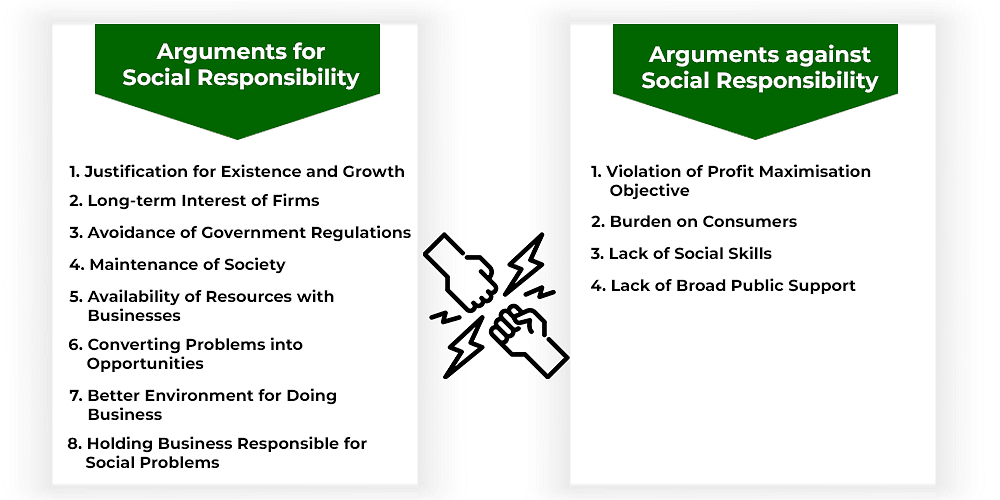
Arguments for Social Responsibility
- Justification for existence and growth: The ultimate motive of business is profit, as only profit can help the business grow and expand. Profit should be made as an outcome of service to society by means of producing goods and services to satisfy human needs.
- The long-term interest of the firm: Business is likely to achieve greater profits over time if society—workers, consumers, shareholders, and government officials—believe it is acting in their best interests. Therefore, it is beneficial for a firm to meet its social responsibilities.
- Avoidance of government regulations: When a particular business is not socially responsible, government regulations tend to limit its freedom. Therefore, it is believed that if businessmen are socially responsible, they can avoid government regulations.
- Maintenance of Society: Laws cannot cover every situation. If people feel they are not receiving fair treatment from a business, they may engage in anti-social behaviour, which can harm the business itself. Therefore, businesses should take on social responsibilities.
- Availability of Resources with Business: Businesses have valuable financial and human resources that can help address societal issues. For instance, they possess management skills and financial capital, enabling them to assist society in solving its challenges.
- Converting problems into opportunities: Businesses have a history of turning risky situations into profitable ventures. By accepting challenges, they can not only address social issues but also make them advantageous.
- Better environment for doing business: Business is unlikely to succeed in a society filled with complex problems. Thus, it is argued that businesses should address societal needs proactively to prevent jeopardising their own survival due to significant social issues. A society with fewer problems creates a more favourable environment for conducting business.
- Holding businesses responsible for social problems: Many social issues, such as environmental damage and unsafe workplaces, have been created or worsened by businesses. Therefore, it is morally imperative for businesses to engage in resolving these problems rather than expecting others to handle them alone.
Arguments Against Social Responsibility
- Violation of profit maximisation objective: This argument states that the primary purpose of a business is to maximise profits. Therefore, any discussion of social responsibility contradicts this goal. A business can best meet its social obligations when they align with both its interests and those of society.
- Burden on consumers: Critics argue that social responsibilities, such as pollution control and environmental protection, can be very expensive. As a result, businesses may simply pass these costs onto consumers by raising prices, making it unjust to burden consumers in the name of social responsibility.
- Lack of social skills: It is believed that business leaders often lack the necessary expertise and training to address social issues. Hence, these problems should be tackled by specialised organisations instead.
- Lack of broad public support: This viewpoint asserts that the general public prefers businesses to stay out of social initiatives. Consequently, businesses may struggle to succeed due to insufficient public trust and cooperation in addressing social challenges.
- Holding businesses responsible for social problems: Some argue that many social issues were caused or worsened by businesses themselves, such as environmental pollution, unsafe working conditions, corruption, and discriminatory practices. Therefore, businesses have a moral duty to engage in resolving these issues rather than expecting others to handle them alone.
Reality of Social Responsibility
Whatever may be the argument, either in favour of or against social responsibility, the reality is in favour of social responsibility. Let us discuss some of them below.
- Public Regulations: To avoid legal action, businesses must act responsibly, as governments closely monitor their activities.
- Labour Pressure: Educated and empowered workers demand fair treatment, pushing businesses to act responsibly.
- Consumer Awareness: Informed consumers now expect ethical and quality products, influencing business behaviour.
- Social Standards: Society now expects businesses to meet social responsibilities along with economic goals.
- Business Education: Education has made stakeholders more aware of the importance of responsible business practices.
- Shared Interests: Business and social interests increasingly align, offering mutual long-term benefits.
- Professional Management: Modern managers value both profit and social responsibility, shaping a responsible business culture.
Businesses have obligations towards:
- Shareholders or owners: Ensuring fair returns and protecting investments.
- Workers: Promoting job security and fair treatment.
- Consumers: Providing quality products and services.
- Government and community: Complying with regulations and contributing to the community.
Kinds of Social Responsibility
- Economic Responsibility: Maximising profit by producing and selling goods and services is required for society.
- Legal Responsibility: Every business needs to operate within the laws of the land. A law-abiding enterprise is a socially responsible enterprise as well.
- Ethical Responsibility: This includes the behaviour of the firm that is expected by society but not included in the law.
Example: should respect religious sentiment and the dignity of people while advertising. - Discretionary Responsibility: This refers to the voluntary obligations that an enterprise assumes.
Examples: Charitable contributions, providing relief during natural calamities, etc.
Social Responsibility Towards Different Interest Groups
Businesses interact with several interest groups such as shareholders, workers, consumers, government, and community business is responsible to all these groups.
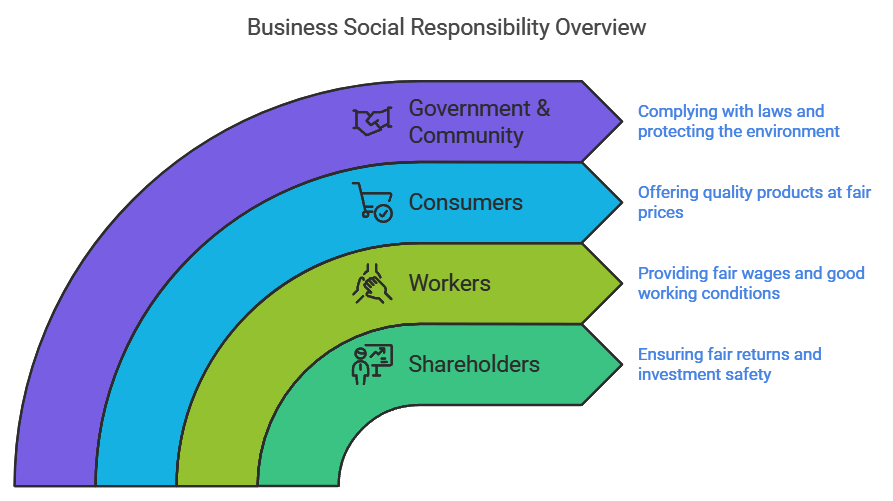
A business unit has to decide in which areas it should carry out social good. A few areas are explained below.
- Responsibility towards shareholders or owners: To provide a fair return on their investment, ensure the safety of their investment and provide regular, accurate, and full information about the business.
- Responsibility towards the workers: To provide opportunities for meaningful work, create the right kind of working conditions, respect the democratic rights of the workers, and ensure a fair wage deal from the management.
- Responsibility towards the consumer: To provide the right quality and quantity of goods and services at reasonable prices and to avoid adulteration, hoarding, dishonest and misleading advertisements.
- Responsibility towards the government & community: To respect the laws of the country and pay taxes regularly and honestly, and act according to well-accepted values of the society, and to protect the environment.
Business and Environment Protection
- Protecting the environment is a major challenge for businesses and policymakers.
- The environment includes both natural and human-made surroundings and provides essential life resources.
- Rapid environmental decline, mainly from industrial activities, is harming public health, especially in cities like Delhi, Kanpur, and Kolkata.
- Pollution, caused mostly by industry, damages air, land, and water, and affects human and animal life.
- It also reduces raw materials, worsens living conditions, and threatens historical sites.
- Since the environment can absorb only limited waste, industries must use technology to minimise pollution.
- Everyone—governments, businesses, consumers, and workers—shares the responsibility to protect the environment.

Causes of Pollution
- Industry: Major generator of waste in terms of quantity and toxicity.
- Business activities (production, distribution, transport, storage, consumption) contribute to environmental pollution.
- Air pollution: Mainly caused by carbon monoxide emissions from automobiles and smoke/chemicals from manufacturing plants.
- Water pollution: Primarily caused by chemicals and waste dumping into rivers, streams, and lakes.
- Land pollution: Toxic waste dumping damages land quality, making it unfit for agriculture or plantation.
- Noise pollution: Sounds from factories and vehicles are not just annoying; they pose serious health risks, including hearing loss, heart issues, and mental health problems.
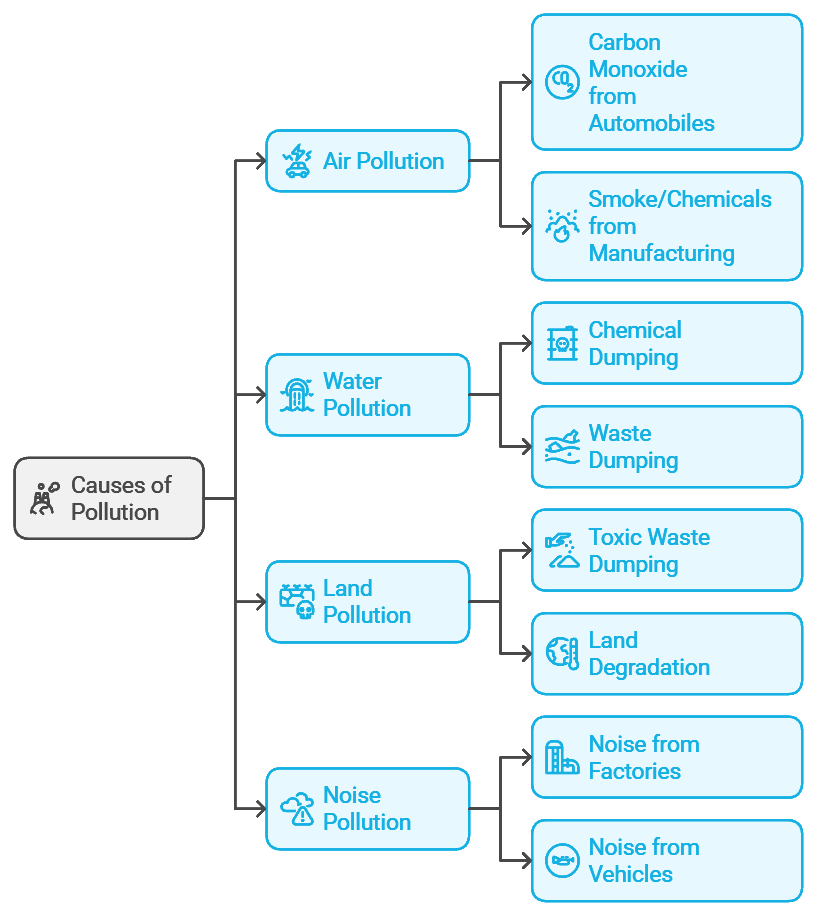
Environmental Problems
Pollution results in the following environmental problems identified by the UNO
- Ozone Depletion
- Land Degradation
- Solid & Hazardous Wastes
- Danger to biological diversity
- Deforestation
- Global Warming
- Water Pollution
- Freshwater quality and quantity
Pollution occurs because the environment can only handle a limited amount of waste.
Need for Pollution Control
To preserve precious environmental resources & improve the quality of human life, pollution control becomes essential. Let us list some reasons for pollution control.
- Reduction of health hazards: Pollution control measures can cause diseases like cancer, heart attack & lung complications and support a healthy life on earth.
- Reduced Risk of Liability: When people are affected by toxicity released by any business, the business is liable to pay compensation. If the business installs pollution control devices, it can escape from such liability.
- Cost Saving: Pollution control needs improved production technology, which automatically reduces costs.
- Improved Public Image: A firm that promotes the cause for the environment will enjoy public confidence and a good reputation.
- Other social benefits: Cleaner buildings, cleaner roads, clearer visibility, better quality of life, and availability of natural products in a purer form are some of the other social benefits society can get through a proper pollution control system.
Role of Business in Environmental Protection

Pollution negatively impacts both humans and wildlife. Among various sources of pollution, industries produce a significant amount of waste, both in terms of volume and toxicity. Businesses can take the following specific actions:
- A clear commitment from top management to foster a work culture that prioritises environmental protection and pollution prevention.
- Engaging all employees in efforts to protect the environment.
- Establishing explicit policies that benefit both human life and wildlife.
- Creating clear policies and programmes to source high-quality raw materials, adopt advanced technology, implement scientific waste disposal methods, and enhance employee skills for pollution control.
- Adhering to environmental protection laws.
- Participating in government initiatives aimed at managing hazardous materials, cleaning polluted rivers, planting trees, and combating deforestation.
- Regularly reviewing pollution control programmes to assess costs and benefits, thereby enhancing environmental protection efforts.
- Organising workshops and training resources to share technical knowledge with suppliers, dealers, and customers, encouraging their involvement in pollution control initiatives.
Since a healthy environment is vital for everyone, we share a collective responsibility to safeguard it. Key reasons for controlling pollution include: (i) reducing health risks, (ii) minimising liability, (iii) saving costs, (iv) enhancing public image, and (v) providing additional social advantages.
Business Ethics
Business ethics refers to the socially determined moral principles that should govern business activities. Ethics define what is right and what is wrong. By ethics, we mean business practices that are desirable from society's point of view. The purpose of business ethics is to guide managers and employees in performing their jobs.
Examples of Business Ethics
- Charging fair prices
- Using correct/accurate weights
- Giving fair treatment to all employees
- Avoiding adulteration, hoarding, etc.
- Not engaging in any illegal methods of operation and not doing anything which is considered undesirable by society.
- Using environmentally friendly products, methods, and processes.
Benefits of doing Ethical Business
- Ethical business is good business
- It improves public image and support
- Earns people’s confidence and trust
- Leads to greater success
- Helps in long-term standing
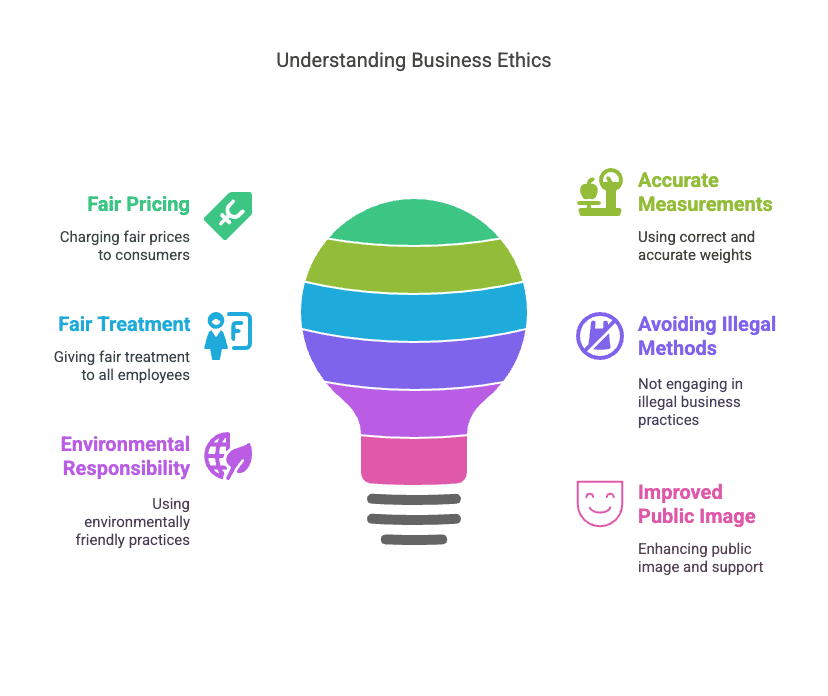
Elements of Business Ethics
- Top Management commitment: The leaders of a company play a vital role in promoting ethical behaviour throughout the organisation. The Chief Executive Officer (CEO) and senior managers must be visibly committed to ethical practices, providing ongoing leadership to develop and uphold the organisation's values.
- Publication of a ‘code’: Companies with strong ethics programmes often outline their conduct principles in a written document known as the 'code.' This typically includes aspects such as basic honesty, legal compliance, product safety and quality, workplace health and safety, conflicts of interest, fair employment practices, equitable marketing, and accurate financial reporting.
- Establishment of Compliance Mechanism: To ensure that decisions align with ethical standards, appropriate mechanisms must be put in place. Examples of these mechanisms include focusing on values during recruitment, incorporating ethics into training, regularly auditing performance for compliance, and establishing communication channels for employees to report unethical behaviour.
- Involving employees at all levels: Employees at various levels are essential for implementing ethics policies and making ethical business practices a reality. Therefore, it is crucial to involve them in ethics programmes. For instance, small groups of employees can be organised to discuss key ethics policies and assess their attitudes towards these policies.
- Measuring Results: While it can be challenging to measure the outcomes of ethics programmes accurately, companies can conduct audits to check compliance with ethical standards. The management team and staff should then review the results to discuss further actions.
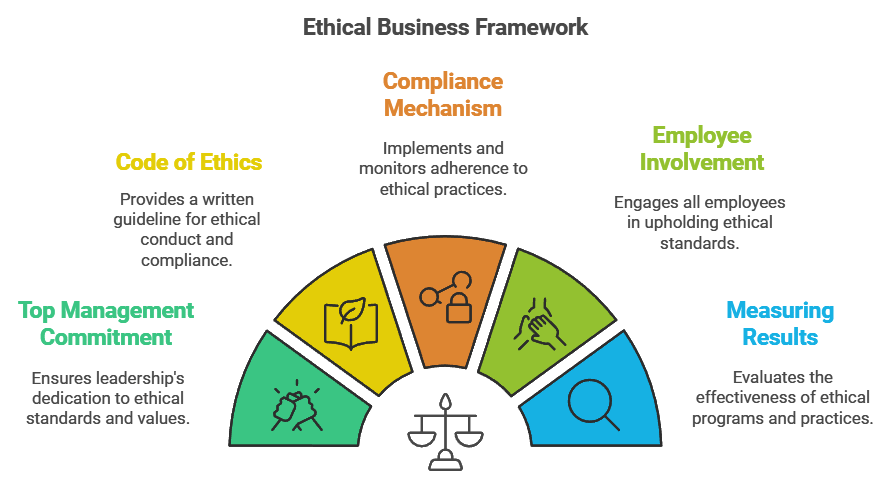
|
38 videos|180 docs|28 tests
|
FAQs on Social Responsibilities of Business and Business Ethics Chapter Notes - Business Studies (BST) Class 11 - Commerce
| 1. What is social responsibility in business? |  |
| 2. Why is there a need for social responsibility in business? |  |
| 3. What are some common arguments in favor of social responsibility? |  |
| 4. What are the main arguments against social responsibility? |  |
| 5. How can businesses contribute to environmental protection? |  |

















